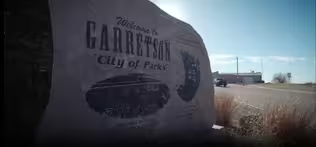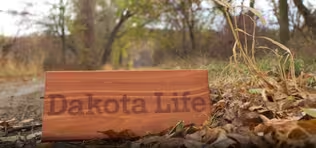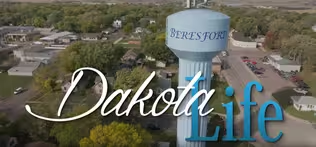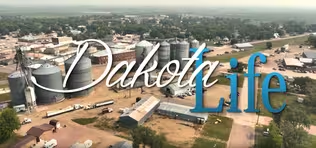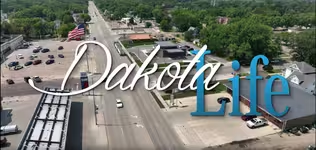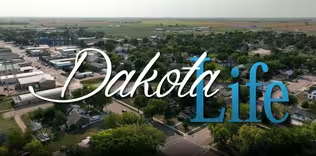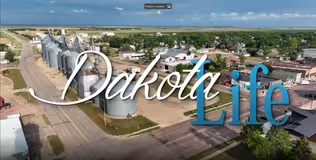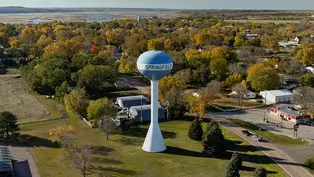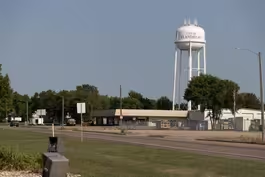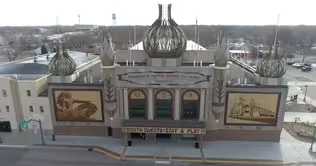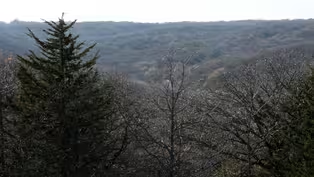Dakota Life
Greetings from Wessington Springs
Season 27 Episode 7 | 29m 45sVideo has Closed Captions
Most cities shape the landscape they’re on, but in Wessington Springs it’s the other way around.
Most cities shape the landscape they’re on, but in Wessington Springs it’s the other way around. Learn about how the people have shaped the town with Rockin’ Ribfest, the legacy of Whiskey Road, the impact of FFA, and the beauty of Shakespeare Gardens.
Problems playing video? | Closed Captioning Feedback
Problems playing video? | Closed Captioning Feedback
Dakota Life is a local public television program presented by SDPB
Support Dakota Life with a gift to the Friends of Public Broadcasting
Dakota Life
Greetings from Wessington Springs
Season 27 Episode 7 | 29m 45sVideo has Closed Captions
Most cities shape the landscape they’re on, but in Wessington Springs it’s the other way around. Learn about how the people have shaped the town with Rockin’ Ribfest, the legacy of Whiskey Road, the impact of FFA, and the beauty of Shakespeare Gardens.
Problems playing video? | Closed Captioning Feedback
How to Watch Dakota Life
Dakota Life is available to stream on pbs.org and the free PBS App, available on iPhone, Apple TV, Android TV, Android smartphones, Amazon Fire TV, Amazon Fire Tablet, Roku, Samsung Smart TV, and Vizio.
Providing Support for PBS.org
Learn Moreabout PBS online sponsorshipMore from This Collection
Dakota Life stories from towns in southeast South Dakota
Video has Closed Captions
Discover the beauty and history of Palisades State Park, goat yoga, and a very special love story. (29m 46s)
Video has Closed Captions
Beresford hosts the Frostbite 4, a regional favorite winter road race. (26m 26s)
Video has Closed Captions
From a window to the past to raising the next generation, Dakota Life explores Wagner. (28m 53s)
Video has Closed Captions
Greetings from Madison, the center of Lake County. (28m 55s)
Greetings from the Corn Palace
Video has Closed Captions
Greetings from the Corn Palace plus stories from southeast South Dakota and Aberdeen. (26m 16s)
Video has Closed Captions
Dakota Life showcases Newton Hills and the SD State Park system. (28m 5s)
Providing Support for PBS.org
Learn Moreabout PBS online sponsorshipThis is a production of SDPB.
It's really a great community.
I mean, the community - drop of the hat wants to help.
It's a small town.
You know everybody.
It's nice to grow up in and boring in the best way possible.
The foothills over west of us.
We got the springs, you know, natural water.
And Wessington Springs is kind of like a kind of like a village where everyone helps everyone work together, whether that's volunteering, owning businesses and truthfully, just the support.
So that's what makes Wessington Springs really Wessington Springs.
Join our crew as we meet the people of Wessington Springs.
Take two!
Greetings from Wessington Springs.
Greetings from Wessington Springs.
Greetings from the Cone Zone here in Wessington Springs.
Greetings from Wessington Springs, South Dakota.
Greetings from the Kyle Evans Memorial Wagon Train here in Wessington Springs.
Greetings from Wessington Springs.
Greetings from Springs Food Market and Jensens in Wessington Springs, South Dakota.
The Spartans go.
Welcome to Wessington Springs.
Greetings from Wessington Springs.
Greetings from Wessington Springs Dakota Life - Greetings from Wessington Springs, is supported with your membership in the Friends of SDPB.
Thank you.
With help from Horizon Health at Horizon Health were rooted in what's real and what's rural, where local providers are dedicated to caring for our way of life.
Regular, medical and dental checkups are important.
More at horizonhealthcare.org and from Agtegra Cooperative, your local hometown cooperative farmer owned for over 100 years.
Agtegra.
Strong, stable, dependable and local.
Donors to the Explore South Dakota Fund support the production of local documentaries and other programs of local interest.
Presented by SDPB.
Friends of SDPB appreciates their support of this program.
Hello South Dakota.
My name is Tim Davison with SDPB and we're here today in the beautiful town of Wessington Springs.
Most cities shape the landscape they're built on, but here in Wessington Springs it's the other way around.
So we're going to take a hike through history with Doctor Dean, who's going to show us the lay of the land.
It's nice to meet you.
Nice to meet you.
We are ascending the Wessington Hills, which were carved by massive glaciers during the last ice age.
As they melted, they left behind moraine boulders and a unique place on the prairie that people would call home for the next 10,000 years.
These hills continue to impact the lives of residents to this day.
[Dr. Dean] The springs that come out of these hills, they have provided water for the community.
Since its founding, we have never been short of water.
Even in the driest years.
These hills and the gulches in the hills, have for many years been a meeting place.
As people were traveling through, because there has always in these hills, there's been water and cover and, especially for people that were traveling west, across the prairies, the protection of the gulches and, and the water were very valuable commodities.
Without those, you could get in big trouble, and many people did.
It's a tough place.
And in those times, it really was a tough place.
Gangs of horse thieves operating in this area.
And this is where they hid the horses and run them off the gulches.
And and they can't get out at the other end and they can't find this or just like corral and supposedly.
So there was a story in one of the history books that, some of the, residents here thought they'd better check this out.
And they started walking up here.
And as they got to the mouth of the gulch, there appeared a very ugly looking guy with a great big gun who suggested maybe they should go someplace else.
And they listened?
And they did!
[...laughter...] [narrator] Doctor Dean also left these hills for a time.
[Dr. Dean] Went to high school here, and then basically left the state for 15 years and went to college and, and, medical school and then eventually moved back here after I found a wife out on the West Coast and have been here since, 1978.
And we've been very, very happy here.
She was one of the first civilian midwives in the state.
And, I practiced family medicine.
About three years ago, I decided that was, it's time to retire, so I did, but we, you know, I have to say, you're going to stay there and said, absolutely.
You're going to stay here and we're more comfortable here than I think any place else we can be so..
There is a sense of community here, and that's a sense that I think is missing in so many areas.
And it's a I think it's a real problem.
You know, the Surgeon General just, a year or so ago issued a report that one of the major problems our society faces is loneliness.
Even though people live fairly densely populated areas, they don't have connections.
If we ever need any help.
You know, our neighbors around here, we've known for a long time, and we we can call on them for basically anything we need.
And when you go around town, you know, you know the storekeepers.
And it's just, a comfortable place to live.
So are you saying that you're, Physician's recommendation is for community?
Yes, absolutely.
While examples of community exist all over town, producer Greg Beesley visits one of the saucier events on the annual calendar.
[Greg Beesley Narrates] In the late summer every year in the foothills of Wessington Springs, you can hear music playing, And you can see and smell the smoke of the annual Rockin' Rib Fest.
I used to be the executive director for Wessington Springs Area Chamber Development, and that's when we started with, um, So when we when kind of came up with the concept of it and I kind of rolled with it.
[narrator] Like any good festival, you have to have food, but instead of lining the parks with food trucks, Lorre thought of a way to make it into a competition by cooking ribs.
[Lorre] That was my husband's suggestions, actually.
I said, you know, what?
Can we if we had a barbecue, what could we do?
And he said, ribs are probably the easiest.
They can cook it within like six hours.
It's just a one day thing.
They don't have to come up and spend the whole night before they can come up that day.
They can cook the ribs, they can be done, they can shut, shut everything up, and then they can go enjoy the festival with everybody else.
Thus, Rockin' Rib Fest was born, and after a bunch of locals missed the opening year, they began to hear about a way to compete against each other.
That includes the boys over at Grill Team Six, the local town sheriff, Jason Weber, and his partner, local firefighter Jarrod Bultsma We've been family friends here for quite a few years, and, just we have a lot of fun together, eat a lot of ribs year after year.
We're working on our process for the next year.
Camaraderie, if that's what you want to call it.
Yeah.
The camaraderie.
The, I got a little bit of harassment the first year about not entering, and then, the night before, I just decided to do it.
And, here we are three years later, I, you know, we've taken, the judge's choice two years in a row.
[narrator] Because with the victors go the great spoils of talking trash all year long.
"If you want bad ribs, You got to try them on that nasty grill right there.
That is the main goal is to the sheriff Weber.
That, I think that's most everybody's goal anymore.
It started right when we got the trophy last year.
As soon as we got done, the trash talk started right away.
It's terrible.
The text messages back and forth is, I mean, you could probably print that off and sell that, and, you know, put it in, put it in printable form, and people would buy it.
[narrator] To avoid being the butt of the joke for the year.
And a lot of local teams work on their recipes and technique.
365 in fact, most teams spend Friday night camping out in the park.
[Lorre] They brought out some expensive smokers for this just to have at Ribfest.
I come here every year and I see these guys come in and set up every year.
They like this year they were all set up on Friday night.
You know, there's they're not messing around with Saturday mornings anymore.
[narrator] With everyone working hard, cooking ribs early in the morning.
Well, I leaves the most important meal of the day unattended.
Answer.
Brian Kolousek.
Well, my partner, who is not here right now, but he won this, or his company gave him this, and he just brought it up here.
And we just started with a few potatoes and some bacon.
And pretty soon everybody kept bringing stuff and bringing stuff, and now it's a pretty big deal right now.
[narrator] So whether you want to eat some great food or listen to some great tunes Rockin' Rib Fest is the place to be, it's fun.
Like I said, we have a lot of fun going back and forth and it's it's just a good time to get out, hang out with friends and everything.
Again, the camaraderie, the banter back and forth, you know, it's it's it's it's positive, but we're just encouraging each other.
And just like now, you know, I got we're cooking breakfast over there, you know, with everybody else.
So it's a, it's a community event to really I mean, this is kind of part of the whole greater Foothills Days concept that we've we developed and this is just a time for Wessington Springs to really shine.
[Host Narrator] Those smiling, occasionally barbecue sauce covered faces are what make up Wessington Springs.
It's a town built by its people, and it all started with a Methodist minister named A.B.
Smart.
He had a dream to build a town far from the sinful cesspits of the cities.
And in the 1880s, he founded Wessington Springs.
Reverend Smart was big into the temperance movement, and thus so is this town.
Wessington Springs was a dry town until the 1970s, and the stretch of road between them and a neighboring wet town was nicknamed Whiskey Road.
[...rowdy rock music...] Wessington Springs was started as a religious community, supposedly free from alcohol.
And so we were one of the last communities in the state to allow alcohol into the town because it never got voted in, because of the strong temperance influence.
Well, when the railroad came through in 1903, a little town of Lane sprung up about eight miles to the east.
And, they had no such restrictions because they didn't have the background out here.
And so they would sell liquor.
And there was quite a few people in this area who appreciated a little nip once in a while.
So they would go to Lane, the little town of Lane eight miles to the east on a gravel road, and buy their bottle of whiskey.
It was the shortcut.
It stayed off the main highway and it was, very popular on Friday nights.
There were a lot of folks who would buy their bottle in Lane, mix it in a glass pop bottle on the way home, and then throw that pop bottle when they were finished out in the road ditch along Whiskey Road.
It became kind of a goldmine for local kids who could go out and harvest those pop bottles and sell them again for $0.02 a bottle.
And so it was pretty well known.
Still is well known around here as Whiskey Road.
[narrator] These hills have witnessed a lot of history, both before and after the founding of Wessington Springs.
The town's hiking trail, Old Grade Trail, was also carved by history.
It traces the path where wagon trains went up the Wessington Hills and west towards the horizon.
They've witnessed several fires that reshaped downtown.
They've witnessed three tornadoes, including the 2014 tornado that destroyed over 50 houses and left 77 residents homeless.
But in the face of disaster, well, Wessington Springs built itself back up.
Because that's what the people here do.
Over the years, they've built themselves into a one of its kind community.
And when they need to, they rebuild it all over again, just like they did with the tornado and the grandstands on this beautiful ball field behind me.
Let's talk about a few attractions that make this town so unique.
There's the 1905 opera House, which started as a silent movie theater before becoming a fire station and then reopening as a live theater.
There's the historic Carnegie Library that was built in 1917, and it was the last of its kind to be constructed in the state of South Dakota.
And there's the Vessey House, home to Governor Robert S. Vessey, known for helping make Mother's Day a national holiday.
We'll meet up with its current residents soon to learn about a beautiful attraction across town that was inspired by Shakespeare.
But first, let's meet an artist working in this millennium.
[Kenzee Schafer] It worked out really well just to have the yellows and the blues it would tie into the FFA, and it also can tie into our school itself.
And with the length of the hallway, I wanted to make sure that it had a nice flow to it.
And it's something that your eye can follow the whole way through.
And I usually do a lot more realistic stuff, but I was able to look at the space and go, this needs something a little bit more abstract.
It needs some patterns, it needs character, needs life, it needs color.
We wanted to incorporate the C.D.E.s of the FFA program.
So we wrote out each of the contests onto the mural and added a little tidbit of each contest, just to kind of represent each one.
I love to incorporate the C.D.E.s, the different contests, and I knew a lot about all of them just from being in FFA, but I was happy to just kind of go through and say, now, which one would it represent?
This contest the best.
I did floriculture when I was in FFA.
So the last bouquet that I worked on with our coach was the one that I put on there, which maybe a little too personal, but I had a lot of fun doing it.
[narrator] Kenzee is one of many whose life was impacted by lessons learned beyond this door.
Brady Duxbury is another.
[Mr. Duxbury] I think that the talent here is incredibly high, but maybe even more so.
The desire to be as excellent as you can be in your particular area.
My name is Brady Duxbury.
I'm the ag teacher here in Wessington Springs.
I'm also the FFA advisor.
I grew up in Wessington, South Dakota, which is about 40 miles north of where I'm actively teaching right now.
I was in the second biggest class in the school.
There was eight of us.
So all the way up until my eighth grade year, I did for H. And we didn't have this thing called FFA.
We had legislation that came through, that forced our school to close if it was below 100 kids.
K-through-12.
I then came here and met my ag teacher, Mr. Shryock, for the very first time my freshman year.
So my first year, I had 20 kids in my class that I would never know all their names.
I got involved when Mr. Shryock found something in me, I couldn't find it myself.
[Mr. Shryock] Education's not tough.
Pat them on the back when they need it and kick them in the butt when they need it.
There's good kids under all of them, pretty much, you know?
It's like having cows, You can't save them all.
But you sure try.
He basically asked for people to go compete at the district level, and I said no.
So then he went up to my table and slapped my my grading paper on my desk, and it said 98%.
And then also underneath it said, "You're going to districts."
So, I didn't really have a choice.
And that's what I credit as starting my career down this way.
I have been blessed with the opportunity to be at several different schools throughout my career.
I have taken over for three 20+ year and teachers, so I kind of have an experience of doing that.
And it's hard, when someone who is experienced, 20 years in school, they have created a personality and they have created a set of expectations.
What I will say is that this program in this community has been far not the best part of it is because some of what I do is probably a little bit like my old AG teacher.
[Mr. Shryock] I spent 39 years teaching here.
My dad was a member of this chapter.
My brother was in four years before me, and my great uncle actually started this program in 1915.
And it had a good tradition then.
And so when I came back, it was it was kind of on the down side.
And you just slowly build it up.
But I don't like to compare it to athletic programs.
But if you look at some towns, they just know how to win.
They got put to work and I'll take hard work over talent any day.
This town has always had wonderful community support.
Talking with other ag teachers that say, how do you get along with your board?
I said, well, six out of the seven were chapter presidents when they were in high school.
I've been FFA for four years now.
I serve as the chapter's president.
And yeah, I would say what happens to make Wessington Springs FFA different is we have such a rich history of competing well.
I mean, we had Mr. Shryock up until my freshman year and then Mr. Duxbury came in and he did a great job taking over.
And we just hope to keep that tradition alive every year.
We've had Mr. Duxbury so far was sent to national team, to FFA.
National Ranger is in Oklahoma City and national convention was in Indianapolis.
Really, when I was there, I wouldn't want to live there.
There's just way too many people for me.
But it's really cool to get an outside look.
I mean, I've never really traveled anywhere like that, so it's really a great opportunity to go places as a high schooler.
For me, coming from a farm, it's a little different.
I know a lot of stuff, but this is not just for farm kids, a boatload of different opportunities in the program.
We got like 20 different CDE's, and that really gives you a look into each and every career.
I mean, it's a good way to find out what you want to do in life.
We are seeing a revolution of kids being able to choose career and technical paths, that companies will pay for.
And we're not talking about low paying jobs.
The fact is, I tell my kids at the beginning of every semester, and throughout the year, if I'm teaching something that isn't used in the real world, then we need to stop and change direction.
[narrator] Of their many projects and the real world, one has helped grow community connections into a blossoming annual tradition.
[Mr. Shryock] The big one that I always liked is Shakespeare Gardens.
It was overgrown.
It was a mess.
And they asked us to come in and I came in with ten kids on a Sunday, three pickups, five chainsaws.
They did a wonderful job.
And then so that started a tradition of going up there twice a year.
I think it helps build pride in the community because kids think it's theirs too.
[Susan Arnott] Kids from Wessington Springs High School come and they do a lot of things.
They clean up the garden for us in the spring and in the fall.
They get it ready for us to begin planting in the spring.
And they have been coming with their teacher every year, I believe, since the restoration began.
Emma Shay started Shakespeare Garden in 1927.
She had been a college professor here in kind of her later years.
She, taught English here at Wessington Springs College, which it had been called Wessington Springs Seminary, but it had become Wessington Springs Junior College in about 1920.
And Mrs. Shay wanted to see the homes of the British authors.
And she did.
She spent the summer by herself in England.
She took out a loan of $1,000, went on the train and then, of course, a ship, and spent that summer 1926.
And when she was there she collected little twigs and flowers and things, press them, because she had her flower press with her.
She brought those back, along with folios that she bought in England.
And, her students helped her mount those in these folios, and they sold those for $5 apiece and repaid the loan of $1,000.
The following year, she had decided she would like to have a Shakespeare Garden in Wessington Springs, on the campus of Wessington Springs College.
And the powers that be at the college gave her this hillside land here full of rocks and things, I suppose.
But they started a Shakespeare garden here in 1927, on Shakespeare's birthday in April.
That is what we consider to be the very first day of Shakespeare Garden.
The students helped a lot.
Her husband, Clark, helped a lot getting the garden started.
Lots of places around the state helped, with seeds and things.
And she planted things that were probably grown in the in the Shakespeare Garden in England through the years.
She gave many talks around and a lot of entertainment and things to fund the garden.
Mrs. Shay died in 1945, in the cottage here.
The cottage was built in 1932 to be the retirement home for her and her husband, Clark, and the cottage was designed because Mrs. Shay had a picture postcard, so they used a picture postcard to design and build this house, and for a few decades after their deaths, the garden was kept.
People in town helped the students help until the closing of the college, which was in 1964.
And then a wonderful woman bought the property, sort of, I think, to save the property.
She and her family lived here while their kids were going to high school, and so I think she preserved the place as best she could.
The house was rented for a while, and so it wasn't in the best of shape.
By the time Shakespeare Garden Society formed in 1989, Roberta Unruh, Kathy Dean and Brenda Dinas are the three women who I think sort of single handedly saved this place.
I wrote a letter to all the alumni that we could find addresses for of the Wessington Springs College and Academy.
Then we were able to buy the property back and start the restoration.
It was a shingle roof at first, and we think that Mrs. Shay wanted to have the cottage thatched, but it never was in her lifetime.
We have had music in the garden and that has been very successful.
If somebody wanted to have a tea for eight people, they would schedule a tea and we would do that.
There have been things like abbreviated Shakespeare plays in the garden.
We've had a lot of weddings in the garden, as you can imagine.
It's really a nice place to be married, usually out in the garden, but we had one a few years ago in February inside the cottage.
So, "A touch of nature makes the whole world kin."
We use that for our sort of our quote for everything.
We have it on our stationery.
We have it on our on sign in the garden.
And it's always been here that I'm sure Mrs. Shay started that.
[narrator] Shakespeare must have loved nature.
He wrote, "And this our life, exempt from public haunt, find tongues in trees, books in the running brooks, sermons in stones, and good in everything."
I think he would have loved to visit the prairies and hills of Wessington Springs, and also to befriend the bard who called this place home.
[Voice of Kyle Evans] You know, over the years there have been all kinds of songs written about the cowboy.
Many of these songs were written by the cowboys themselves and later changed or added to by other cowboys to suit their own situations.
There were songs about cattle, about horses, about life and love and the loneliness of working the open range.
[narrator] Those songs are still being sung by those who make a home on this range, and while some make their change, others prefer to keep it the same.
So I'm Phil Wipf, a rancher from Wessington Springs, South Dakota, and I'm the president of the Kyle Evans Memorial Wagon Train.
So we started the wagon train in 2011, on the 10th anniversary of the passing of Kyle Evans.
Basically, we started it to not only to honor Kyle, but to honor the traditions that Kyle was about, which was the Western lifestyle, the horse culture, the wagons, the stagecoaches, the, the saddle horses used to the Western lifestyle.
If we don't demonstrate teach this to kids when they're younger, it's going to go away.
We're a community that's kind of on the edge of the farming area to our east, in the ranching area to the west.
And we're right here on on this hillside.
And the land changes right here.
If you go west, it's rolling hills.
It's more ranch country.
If you go east, it's more farm country.
So you have to find a individual that knows the area that you're going to travel through.
And there are individuals that help us out, like Bob Hine, in helping us organize our route for today.
So we have to find landowners that will let us cross their ground.
Everybody's great about that.
And then you have to find people with a knowledge of that area.
Those pastures, those hay fields, you team up with them to help you find a route because you can't just go anywhere with wagons.
Some of these people have been coming for 14 wagon trains.
So you're seeing old friends, and that's great.
The people that come in from a distance, they need to come on Thursday.
So now we've organized.
We have a potluck on Thursday night and that's a great time.
We got a guy that cooks, he claims the best liver and onions you can eat.
And so far everybody says it's great.
I haven't eaten it yet.
But my wife says it's great.
So someday I'll try it.
In the past, the Company Cowboys have sang and other local talent has has sang.
This year we have a we have a new startup group in town called The Good Old Boys, high school dids.
But they're great, you know, so they sing old Kyle Evans songs, old Merle Haggard songs.
The cowboy culture is a culture all of it's own.
The horses, the rodeos.
We just want to keep alive that.
That cowboy cowboy heritage that we have here in the Western Springs area.
If you missed any of our stories here in Wessington Springs, or you just want to take another look, you can visit us at SDPB.org/dakotalife.
And from all of us at SDPB Thank you for watching Dakota Life.
I'm Tim Davison here in Jerauld County.
We'll see you next time.
[Kyle Evans singing] Home.
Home on the range.
Where are the deer and the antelope play.
Where seldom is heard, a discouraging word.
And the skies are not cloudy all day.
Oh, give me a home on the range....
Support for PBS provided by:
Dakota Life is a local public television program presented by SDPB
Support Dakota Life with a gift to the Friends of Public Broadcasting
